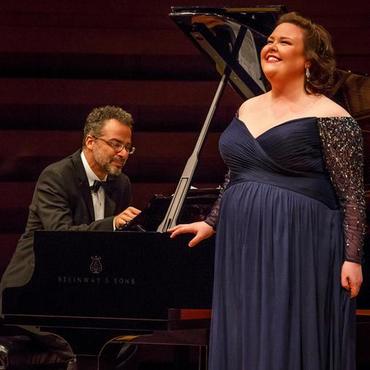 Jamie Barton and Bradley Moore at Koerner Hall. Photo: James M. Ireland.
Jamie Barton and Bradley Moore at Koerner Hall. Photo: James M. Ireland. Well aware of Barton’s vocal powers, I approached her recital on Monday (July 25) with a mixture of anticipation and trepidation. What would she do, and how would she sound, when accompanied only by a lone piano? As I’ve said before, and will probably say again some day, there are some opera singers who do Lieder well, and others (including some highly celebrated others) who really shouldn’t do it at all.
Opening with Homenaje a Lope de Vega, a set of three Spanish songs by Joaquín Turina, Barton clearly established her understanding of the subtlety that’s called for in an art-song recital – without sacrificing any of the vocal richness that’s quickly making her famous. The first two songs – “Cuando tan hermosa os miro” and “Si con mis deseos” – were notable for their tenderness. And in “Al val de Fuente Ovejuna,” she spread her wings a little, showing off her plummy low register and luminous high notes.
In three selections from Ernest Chausson’s Sept melodies, Barton was all sweetness and light, singing with great purity of tone. Here, especially, she demonstrated her ability to convey a musically intimate connection with her audience in a recital with piano.
Turning to Schubert, Barton was deeply solemn in “Der König in Thule. Then she effectively introduced an agitated intensity into “Gretchen am Spinnrade” and also into “Rastlose Liebe.” In the latter song, her long, purposeful crescendo to the words “Und ach, Sein Küss!” was intense and exciting. And in “Schäfer’s Klagelied,” she introduced a veiled tone that gave way to an otherworldly radiance.
Czech is a hard language to sing in (unless, of course, the singer speaks Czech). But Barton seemed entirely at home in Dvořák’s Cigánské melodie. Here she aimed for contrast, with sudden changes in tempo and dynamics, ending the set of songs with a dramatic flourish.
Up until now, Barton’s recital had been a musical tour of Europe. But she ended her program with some repertoire a little closer to her roots in the American South. “Swing Low, Sweet Chariot” and “His Eye is on the Sparrow” (in sophisticated arrangements by H.T. Burleigh and James Ivey) both had a touching immediacy. And “Ride on King Jesus” (another Ivey arrangement) was fervently triumphant.
Two encores followed. The song “Var det en Dröm,” by Sibelius glowed with the intensity of liquid metal. “Acerba volutta” from Cilea’s Adriana Lecouvreur was the only opera on the program. Here, she indulged herself with a big verismo sound. And why not? By this point in the evening, she’d earned the right to a little fun.
© Colin Eatock 2016
 RSS Feed
RSS Feed

